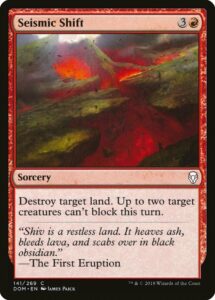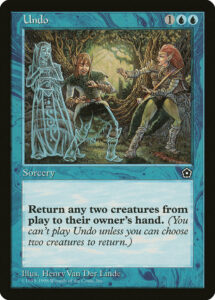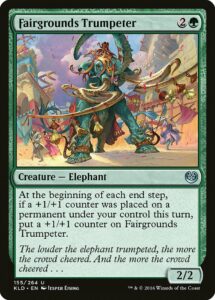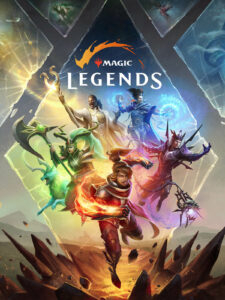Magic has undergone many changes over the past year. Some were necessary reactions to the global pandemic. Most preceded it. Some changes were popular, some were soundly criticized on social media, and a few—like Secret Lair: The Walking Dead—were both. One of today’s biggest sticking points is Universes Beyond, where Magic will partner with other IPs to produce non-Standard legal products, such as Warhammer 40k Commander decks and an expansion set on Tolkien’s Middle Earth. Many are anxious and upset about this change.
To you, and to everyone else, I promise: the sky is not falling.
A Changing Status Quo
I understand that some players are upset that Magic is mixing its brand with other intellectual properties. That they’re worried this will lead to degenerate designs and absurd narrative situations. That it’s hard being reminded that Wizards of the Coast is a business that makes money. That it hurts when a beloved game makes things that aren’t meant for you and suggests that it might not care about you any more. I understand all of that—change is hard, and feeling left behind is painful.
Change is also inevitable. The biggest risk Magic could take is to change nothing—keep making expert level expansions, stay mostly to familiar mechanics, keep designing for the same static player base, and hope that player acquisition offsets player attrition so they can stay in business. Such a tame Magic would never create wild mechanics like double-faced cards or split cards, would never create Zendikar (people scoffed at the idea of land-centric set), and would never experiment with product lines like Modern Masters, Modern Horizons, and Commander. Magic needs to constantly take risks to thrive and Universes Beyond is but one of dozens unveiled this year.
Problems Can Be Fixed
“But Zach,” you might say, “what if Universes Beyond sucks?” If it turns out to be a bad product, then people won’t just complain on social media, they’ll do what companies absolutely react to—they won’t buy it. We know from experience that Wizards is both receptive and quick to action when players en masse are unhappy. Remember Duo Standard? Wizards tried it out, the response was poor, and we don’t see Duo Standard anymore. Wizards aimed to create a more dynamic Standard by having biannual rotations and swiftly reversed course after Standard attendance dropped following the first such rotation. If the first products of Universes Beyond aren’t good, then Wizards will either change course or cancel the line. That said, I expect these products to be of high quality—Wizards has almost thirty years’ experience making Magic sets (and Magic’s first expansion, Arabian Nights, is exactly what Universes Beyond is), so this new product line plays to their strengths.
“But Zach,” you might retort, “what if I hate Universes Beyond? What if it makes me enjoy Magic less?” To you, I say that Magic makes a lot of products and I’d bet you don’t like (or even notice) all of them. If you’re like me and Secret Lairs, Collector Boosters, and Theme Boosters aren’t for you, then you don’t need to buy them. Could Universes Beyond lead to theoretical futures where Gandalf’s Lightning Bolt runs roughshod through Legacy, the entire cast of Smash Bros. Ultimate is Standard legal, and LeBron James joins the Gatewatch? Sure, that could happen, but I’d rather react to what these first products look like than speculate about how bad or weird things could possibly be. I remember being concerned that Secret Lair: The Walking Dead would lead to a second Reserved List because of licensing agreements, then realized how unlikely it is that Rick, Steadfast Leader will ever approach the price of the Reserved List staples that actually gatekeep Legacy, like even the lowly Plateau.
A Bigger Tent
A few months before the pandemic, I was worried that Magic was leaving me behind with all its new product lines not meant for me. Yes, many of those experiments likely helped the game thrive through the disruptions of the pandemic, but I wanted more things targeted to me, like the return of Masters sets. I got that. I didn’t even realize how badly I wanted old border versions of contemporary cards, but Wizards anticipated that desire in another of their experiments, Time Spiral Remastered. With Universes Beyond, the Year of Commander, and Secret Lair: The Walking Dead, Wizards grows the total number of products while still providing all those that large segments of the players love.
Now, this optimistic view I hold isn’t behind rose-tinted glasses ignorant of where Magic has yet to regain ground. Magic fiction is back after years of being either erratic or utterly absent, but we’re a far cry from where it was in 2018. Standard has managed to go an entire set release without any bans, which is both a good step forward and absolutely not something to brag about. There still is no meaningful path to participate in or feel invested in the tournament scene (a problem which predated the pandemic). And there’s an even bigger question: how is Magic—the first game to discover the necessity of rotation—going to function when Commander has overwhelming eclipsed Standard? How will it get players to continue buying Standard products when their contents need to compete with Eternal cards? Will it be able to keep power creep in check while Booster Fun justifies booster packs’ price?
I’m not sure what the future holds for Magic. I’m hopeful that it’s bright and will include the safe return of Grand Prix. I’m confident that Wizards is going to put their all into products like Universes Beyond and will change course as things prove more or less successful than they’d hoped. There’s just one thing nagging at me and has me doing that thing I encouraged you to avoid doing—worrying about a something nebulous in the future.
Wizards & Digital
Wizards of the Coast is very, very good at making Magic cards (and D&D). However, it has not demonstrated itself to be a powerhouse digital production house or licensor of digital games. Shandalar, Battlemage, Duels of the Planeswalkers, Magic: Puzzle Quest—these games may be beloved by some, but none of them stood the test of time. It took years to release a relatively simple app. Magic Online has always been functional, but never amazing. And Magic Arena, the crown jewel of Wizard’s eSports dream, still doesn’t have a spectator mode for tournament broadcasting (or support in-pod Limited play for tournaments). Nevertheless, Wizards of the Coast has been brought into the Hasbro family and put in charge of making videogames.
I’m not saying that Wizards can’t be infused with a ton of money, hire a ton of people from AAA studios, and out-Blizzard Blizzard or follow Games Workshop’s licensing route. New videogame studios do hit the scene and Hasbro has the resources and intellectual properties to create some incredibly successful videogames. But Wizards’ past digital innovations and licensing agreements do not engender confidence in it being handed the reins to a vast videogame-making effort. As Gabby Spartz and Mashi Scanlan say quite well, it’s not good for Magic to be making an MMO (action RPG) when they’ve been on the downswing for a decade. Autobattlers like Hearthstone Battlegrounds and roguelike deckbuilders like Slay the Spire are both more trendy and hew much closer to what Magic: the Gathering is; yet Magic is staying farther from its wheelhouse for its first major offering (and based on the game studios it’s partnering with, for several games).
I wish Wizards success—I would love to play awesome videogames in the Magic multiverse and be perfectly happy if their digital game studio mostly made quality non-Magic games. I worry that being given the monumental burden of building internal digital teams and overseeing external studios not only fails to leverages Magic’s strengths, but could distract from Wizards’ ability to focus on maximizing Magic. But, as I remind myself, these are worries about a possible future, one I have no window into. I look forward to getting to see more of it and playing plenty more Magic digitally and (soon enough) in tabletop, because few things give me as much joy.
And, as always, thanks for reading.
Zachary Barash is a New York City-based game designer and the commissioner of Team Draft League. He designs for Kingdom Death: Monster, has a Game Design MFA from the NYU Game Center, and does freelance game design. When the stars align, he streams Magic (but the stars align way less often than he’d like).





